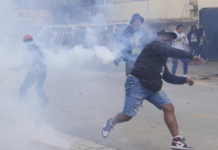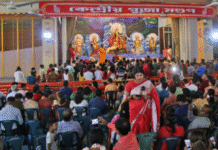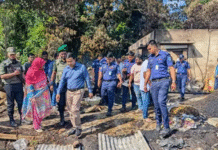
Police and protesters clashed for the second day on Wednesday, after the conviction of a powerful politician in connection with a series of killings during the country’s 1971 independence war. More than two dozen small, homemade bombs also exploded in the country’s north, but there were no reports of injuries.
Local news reports said at least 10 people had been injured Wednesday in clashes outside Dhaka, a day after the latest verdict was announced in a series of controversial war crimes trials. Street battles across the country Tuesday killed up to four people and injured dozens more.
The clashes came after Bangladesh’s largest Islamic party, Jamaat-e-Islami, ordered a nationwide general strike, shutting down schools and shops, to protest the conviction and sentence of life in prison handed down to their leader, Abdul Quader Mollah.
Opposition politicians and human rights organizations have questioned the fairness of the trials into the 40-year-old violence.
Because of the strike, traffic was thin Wednesday on the usually-clogged streets of Dhaka and schools and most businesses were closed in major cities and towns across the country.
Despite tight security in Dhaka, with security forces patrolling the streets, television footage showed protesters throwing stones at police Wednesday in Dhaka. A local news agency, bdnews24.com, reported that police fired rubber bullets and teargas to disperse protesters in the Narayanganj district near Dhaka, leaving at least 10 people injured.
Local media also reported that at least 25 homemade bombs exploded Wednesday in the northeastern district of Sylhet, but there were no reports of injuries or destruction.
Up to four people reportedly died Tuesday in clashes between police and the party activists in Chittagong, 135 miles (216 kilometers) southeast of Dhaka.
On Tuesday, Mollah was convicted of killing a student and a family of 11 and of aiding Pakistani troops in killing 369 other people. Defense lawyer Abdur Razzaq has said he will appeal the verdict.
Opposition leaders have criticized the war crimes trials, held 40 years after the country won independence from Pakistan, as an effort to weaken challengers to Prime Minister Sheikh Hasina’s government. Human rights groups have raised concerns about the trials’ fairness.
Mollah and five other Jamaat leaders had been charged with committing atrocities during the nine-month independence war against Pakistan. Last month, the tribunal hearing the cases sentenced former party member Abul Kalam Azad to death in the first verdict.
The tribunal was formed by Hasina’s government in 2010. Jamaat-e-Islami, a key ally of opposition leader Khaleda Zia, says the trials are politically motivated, and Zia, a former prime minister, has called the tribunal a farce. Authorities deny the claim.
International human rights groups have raised questions about the conduct of the tribunals, including the disappearance — outside the courthouse gates — of a defense witness who was about to testify.
Until it gained independence in 1971, Bangladesh was part of Pakistan, but was geographically separate from the rest of the country. Jamaat campaigned against Bangladesh’s independence war and has been accused of forming several groups to help Pakistani troops in killing, rape and arson. The government says Pakistani troops aided, by local collaborators, killed 3 million people and raped 200,000 women.
Source: ABCNews










There is no doubt about involvement of few Jamat leaders involvement in atrocities during liberation war of Bangladesh.Those who are denying this are either members of badar bahini/razaker/santi bahini or were sleeping inside the cave. ONLY THOSE WHO SUFFERED WILL UNDERSTAND THE PAIN. AS GOOD MUSLIM SHOULD WE NOT ENSURE JUSTICE BY PUNISHING THOSE WHO WERE INVOLVED IN SUCH HEINOUS ACTIVITIES? NONE BUT THE NEXT OF KEEN OF THE VICTIM CAN PARDON THEM.
Mr. Shahjahan is correct in his statement. So are our friends forming human chains and candle light vigils against the verdict? People who are protesting the verdict are also right. We are not saying that atrocities did not happen and that Al Badar and Razakars were not involved. What I object is why this is done after 40 years and for only a few people who allegedly master minded those death/torture squads. What Mr. Shahjahan has to understand, majority of the actual crimes were perpetrated by actions of 195 Pakistanis that were handed over by the Indians back to Pakistan in 1972. I think we should ask why? I would urge everyone to dig history and find it out. Either we go forward full speed as nation forgiving these indicted persons or prosecute all major criminals involved in these massive atrocities. Instead, we concocted a tribunal to try a few people to disrupt a political party allied to BNP which was totally politically motivated. People have to ask Hasina, why a partial indictment? Why a make-shift tribunal? Why not a permanent tribunal and try every war criminal even if it takes another 40 years. I am sure that will make Mr. Shahjahan happy.
Yes. Mr K Islam is right in asking to bring all the culprits to face the trial. Why the trial could not be held for last 40 years? We all know after 1975 the country was ruled by those who worked against our independence. To name some; Mr Shah Aziz who spoke at UN against Bangladesh became the prime minister, Mr Alim, a war criminal became a minister, thus there are thousands other examples. Do Mr Islam mean that if 10 people did a crime and 4 of them caught should not be punished? Who am I to excuse/forget the crime? He who suffered/lost his nearest one can decide whether pardon or not. That’s the teaching of Islam. It could be better if they could forget but can you really force them. If somebody hart my brother I shall try to take the revenge by bringing him to justice. NONE SHOULD STOP ME TO DO THAT. In 1975 suddenly we decided arbitrarily not to try. WAS IT CORRECT?
We had to wait 40 years to see justice prevails. No one should go unpunished even if he comes from blue blood. ALL OF US SHOULD DIG THE HISTORY AND FIND OUT WHO THE CULPRITS ARE? AND HOW THEY ARE WORKING AGAINST THE INTEREST OUR COUNTRY. I’m happy to see the young generation taking interest in the subject and taking active part in the discussion. They don’t require our comment. They can see old newspaper/ books/ journals and decide all by themselves.
Mr. Shahjahan; I am as passionate as many of the people are. In a country where murderers get clemency from the President, how do you get justice from the courts that are dictated by the rulers? Let’s not pick only the period after 1975 as is normally done by the AL government. Let’s include also the period between 1972 till 1975. It seems very convenient to forgo this history by some groups and point to somewhere else. When you accidentally do it inside your pants, you must open your pants and examine it first. It is about time to look forward and keep the past in the history books. I would ask Mr. Shahjahan and others like him to help engage into true history writing rather than writing tilted history for creating a fodder for emotional public and youngsters. AL has inserted a lot of bloated materials in the children’s text books while conveniently deleting good history because it was convenient for them. History cannot be written for the sake of political expediency. It should be accurate – as much as possible. It should never be done for indoctrination like the so called international tribunal. I would urge concerned citizens to sink deeply into the inception and operations leading to the adjudication of this trial. It is totally political and not fair.
WHOEVER DOES A CRIME, WHENEVER IT IS DONE — SHOULD NOT GO UNPUNISHED.
At the same time we should not forget the history. Lets start from 71 and with today. True history will be explored by our future generation.
I will not be surprised if these criminals also get free in the name of politicization.